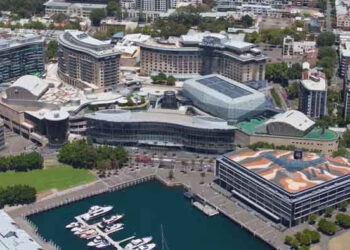By Kate O’Keeffe
Of DOW JONES NEWSWIRES
HONG KONG (Dow Jones)–An arm of U.S. investment firms Oaktree Capital Management LP and Silver Point Capital LP said Thursday it filed a lawsuit against its joint-venture partners in the Chinese gambling enclave of Macau, escalating a dispute over a long-delayed US$2.4 billion casino-resort project.
The suit, filed in neighboring Hong Kong by a unit of New Cotai LLC, accuses Singapore property developer CapitaLand Ltd. (C31.SG), eSun Holdings Ltd. (0571.HK) and their unit East Asia Satellite Television Ltd. of breach of contract, inducement of those breaches and unlawful conspiracy, according to a statement from the New Cotai unit.
CapitaLand said it hasn’t been served in the case but that it believes the claim is without merit and that it will “defend it vigorously.”
“In a statement Thursday, eSun said it hasn’t been served with regards to the suit but that it received letters from New Cotai alleging breach of contract. Lawyers for eSun and East Asia are preparing a response, the statement said, adding that eSun will defend all claims brought against it by New Cotai.”
The dispute concerns Macao Studio City, which was originally set to open last year in the prime Cotai area of Macau, the largest gambling market in the world and the only place in China where casino gambling is legal. The 6-million-square-foot site is adjacent to Las Vegas Sands Corp.’s (LVS) massive Venetian Macao casino-resort complex. Wynn Resorts Ltd. (WYNN) also plans to build a casino in the area.
The project initially attracted interest from Marriott International Inc., W Hotels, Ritz-Carlton Hotel Co., mall-operator Taubman Centers Inc., and Playboy Enterprises Inc.’s Playboy Mansion. But Macao Studio City’s development has been stalled for more than three years amid a bitter dispute between the partners. Taubman and Playboy Enterprises backed out in 2009.
New Cotai joined the project in December 2006, when it paid eSun about HK$1.3 billion (US$168 million) for a 40% interest in the Macao Studio City joint venture and the rights for its unit to develop a casino within the project. ESun and CapitaLand own East Asia, which has the remaining 60% interest in the joint venture. But the two sides have been unable to work together.
“We are disappointed that these legal proceedings had to be initiated,” said New Cotai Chief Executive David Friedman. “However, after making exhaustive efforts to resolve the situation amicably, we believe we had no choice but to take this step to protect our investment and Macao Studio City,” said the former Las Vegas Sands executive.
The latest lawsuit comes after a Hong Kong court in July threw out a US$2.39 billion suit by East Asia against New Cotai and Friedman, calling the claims “untenable.” East Asia, which wanted to renegotiate the terms of the joint-venture agreement, had alleged that New Cotai and its directors failed to cooperate on the casino project, hindering its development.
However, the judge said there is “a good arguable case” regarding a separate US$88.6 million claim against Oaktree and Silver Point “for inducing New Cotai to breach” a share-purchase agreement. Friedman said at the time that New Cotai would “vigorously defend the remaining claims.”
The lawsuits follow the U.S. investors’ offer to buy out eSun’s stake in the Macau project at HK$1,200 a square foot in July 2008, according to some people familiar with the matter. Late last year, eSun offered to buy out the U.S. group’s stake in the project at HK$400 a square foot, said the people.
Meanwhile, the Macau government has threatened to take back undeveloped land in the Chinese territory, raising further questions over the future of the project.
In its statement Thursday, CapitaLand–which has an effective 20% interest in the project–said that “eSun has affirmed an indemnity in favor of CapitaLand in respect of any losses which may be suffered by CapitaLand in any legal proceedings” brought by New Cotai regarding the Macao Studio City project.
Editorial – The real reason Philippines casino revenues are down
After enjoying a post-COVID surge in gaming revenues at its licensed casinos, the Philippines has hit a rocky patch. In...






























